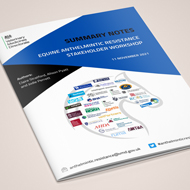VMD shares details of equine stakeholder workshop

A follow up meeting will be convened by the VMD to discuss the next steps to forming a pan-industry equine working group.
The VMD has shared details from its online Equine Anthelmintic Resistance Stakeholder Workshop, describing a “consensus and enthusiasm” amongst stakeholders for involvement in initiatives.
In the workshop, which took place on 11 November 2021, 45 external stakeholders were given the opportunity to share their views and expertise on the core problems associated with anthelmintic resistance in equine parasites.
After a series of brief presentations from people with expertise on the subject, both internal and external, delegates were split into small groups for discussion.
In the released summary notes of the workshop, the VMD said: “There was consensus and enthusiasm amongst delegates to adopt a pro-active joined up approach to address the problems associated with anthelmintic resistance in the equine sector.”
Agreement was formed in discussions on the key principles that underpin best practice for sustainable control of equine parasites, and the necessity of a coordinated approach with a pan-industry equine anthelmintic resistance working group was acknowledged, in order to provide a single source of truth to develop best practice guidelines.
Stakeholders also explored the benefits of introducing standardisation of faecal egg count (FEC) techniques, as well as the importance of better utilisation of existing data and diagnostic tools.
As acknowledged in the summary notes, the VMD has agreed to assimilate these key themes for further exploration.
A follow up Equine Anthelmintic Resistance Stakeholder Meeting will be convened by the VMD to discuss the formation of a pan-industry equine working group, and anyone interested in attending the meeting and being involved in the process should email anthelmintic.resistance@vmd.gov.uk



 The latest
The latest